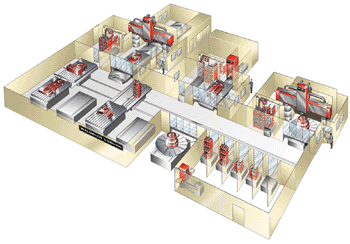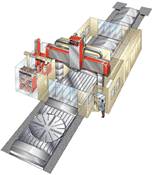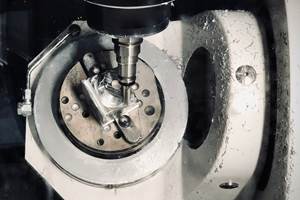Cutting The Cost Of Custom Machines
There is a gap between the price of one of this builder's custom machines and the maximum price that even many large contract shops can afford to pay for capital equipment. But that gap is getting smaller.
Share


Historically a maker of custom-engineered, special-purpose machine tools, the Ingersoll Milling Machine Company (Rockford, Illinois) is not a builder that would appear on most contract machine shops’ lists of potential suppliers. There is a gap between the price of one of this builder’s custom machines and the maximum price that even many large contract shops can afford to pay for capital equipment.
But that gap is getting smaller. In this age of greater emphasis on outsourcing to contractors, the kind of large and expensive workpieces that are well-suited to a custom machine tool are increasingly being assigned to independent shops. And at the same time, the success of many of these shops has left them with more money to spend on bigger and more versatile machines.
And then there is the other side of that gap. As a company, Ingersoll is seeing market changes of its own. The demand for specialty machine tools is narrowing because standard machines today can do so much more.
The result: This builder has decided to broaden its market by launching a line of machine tools that are custom-built only to a point. If the more successful job shops can be said to have partially closed the gap that separates them from custom machines, then Ingersoll now seeks to close that gap the rest of the way . . . by offering machines that use pre-engineered modules to permit more economical customization.
The company calls the line “MultiTec.” What makes this line more economical than its typical custom machines is that the available choices have been limited by design. With the MultiTec concept, “custom” machine building is no longer a matter of anything goes. Instead, ordering a machine from this line more resembles ordering a restaurant meal a la carte. Buyers create their own machines by selecting from a list of modular choices for machine platform, travels, spindle motor, spindle heads, tool storage, and other machine features.
The result is a machine tool that may come closer to being specifically tailored to a given shop’s high-end workload than any machine the shop would otherwise have thought to consider. In fact, the machines are at their most productive when applied to machining large, complex parts complete in one setup. Not only are the travels large, but each machine potentially comes with a range of changeable spindle heads for different applications.
Such a machine may change the way a shop thinks about processing large parts. In addition, representatives of the machine tool builder experience a change in thinking of their own. Burke Doar, the company’s manager of marketing and sales for heavy machinery, explains why. “The customer may want tool capacity of 150 tools exactly,” he says, “and we’re not used to saying no to requests like that. But on the MultiTec machine, tool storage capacity is only available in increments of 64—like 128, 192, and 256.” Insist on a number of tools that doesn’t fit this pattern, he says, and the company can only accommodate the request with a more expensive, truly custom machine.
For each machine specified, the most basic choice is the choice of platform and machine type. There are five options. They include vertical table and gantry-type milling machines, horizontal table and floor-type milling machines, and a vertical turning machine with milling capability. Travels in X and Y—as well as table diameter for the turning machine—generally begin at 49 inches and increase in modular increments up to at least twice that amount. (The gantry-type machine can be specified with X-axis travels up to 65 feet.) For a milling machine’s spindle, possible maximum speed and maximum horsepower combinations include 6,000/60, 3,000/60, 9,000/40, and 24,000/13. Also included among the options for this line are pallet changing systems that can link identical or dissimilar MultiTec machines into a common, centrally controlled cell.
All of these choices do come at a price, says Mr. Doar. When competitors’ standard machines are available that match some MultiTec combination, the MultiTec machine may cost more. The company plans to address this difference by applying value-added resources unavailable to other builders. Chief among these, he says, is the staff of machine tool engineers that have traditionally been dedicated to the company’s specialty machine business. This staff will counsel MultiTec customers through time studies and other process engineering work. In addition, the machine tool builder has a sister company headquartered on the same campus—Ingersoll Cutting Tools—that will serve customers by outfitting the MultiTec machines with tooling packages tailored to the customer’s application. MMS
Related Content
The Future of High Feed Milling in Modern Manufacturing
Achieve higher metal removal rates and enhanced predictability with ISCAR’s advanced high-feed milling tools — optimized for today’s competitive global market.
Read MoreHow to Successfully Adopt Five-Axis Machining
While there are many changes to adopt when moving to five-axis, they all compliment the overall goal of better parts through less operations.
Read MoreInside a CNC-Machined Gothic Monastery in Wyoming
An inside look into the Carmelite Monks of Wyoming, who are combining centuries-old Gothic architectural principles with modern CNC machining to build a monastery in the mountains of Wyoming.
Read MoreHow to Determine the Currently Active Work Offset Number
Determining the currently active work offset number is practical when the program zero point is changing between workpieces in a production run.
Read More











%20milling.jpg;width=700;quality=80)
%20turning.jpg;width=860)
%20right-angle%20milling.jpg;width=860)
%20grinding.jpg;width=860)


%20five-axis%20machining.jpg;width=860)








.png;maxWidth=300;quality=90)






